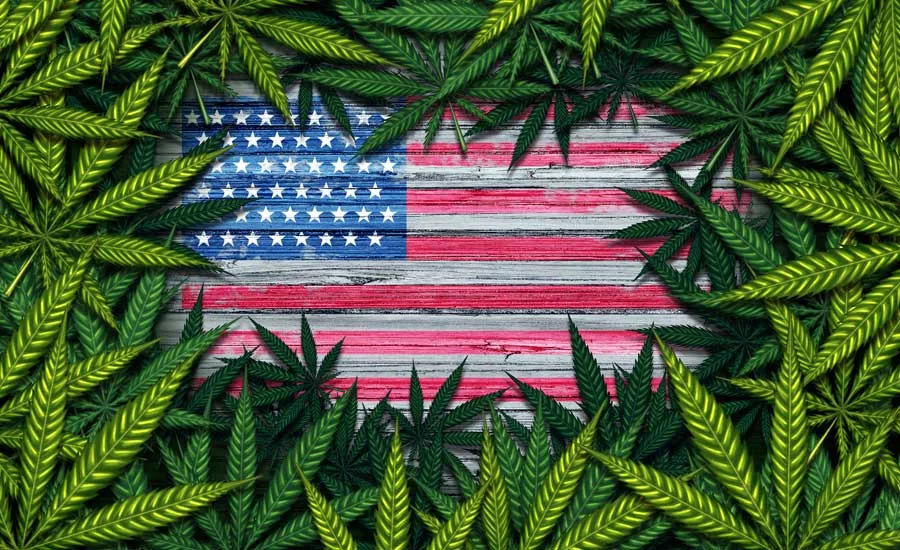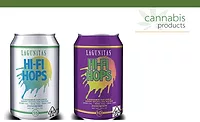CANNABIS PRODUCTS | JUNE 2019
Experts help cannabis edibles manufacturers prepare for future regulation

While more U.S. states continually pass recreational and medical cannabis legislation, opening the door to use of cannabis for personal and health-related reasons, from a national perspective, regulatory authorities lack a centralized, cohesive structure. While some state agencies are moving in parallel directions, companies producing legal cannabis edibles and beverages often need to consult with key experts on the subject in order to cover their legal bases.
Those experts often advise edibles and beverages companies to structure production practices in such a way that they help to preemptively prepare themselves for future potential measures that could impact their business. This often includes looking toward existing guidelines issued by federal agencies like FDA to establish appropriate GMPs and HACCP plans.
Find more cannabis processing equipment and packaged goods at foodengineeringmag.com
Meanwhile, the industry awaits federal guidance on using cannabidiol (CBD) in foods and beverages—a market that’s poised to explode nationwide.
The legal cannabis industry continues to grow more standardized, and the next big thing could be occupational safety and health. Cannabis companies are now looking toward OSHA for examples of best practices and guidance in pharmaceutical, food and other industries that might aptly translate for legal cannabis edibles and beverages production.
State-Specific Experiences
“I talk to a lot of regulatory bodies in different states,” says Kimberly Stuck, founder, Allay Cannabis Consulting, Denver. “They reach out to us, because we offer regulatory training in cannabis. I remember when I was a regulator, I knew nothing about cannabis, and it was very intimidating.”
States that were early adopters of legalized cannabis sometimes serve as strong resources. “There is some communication, but it really depends on the state,” says Stuck. “Some states are more guarded than others.” She notes that when working in Colorado, she was talking to industry associates in California to set testing protocols. “We’ve been working with Pennsylvania, Oklahoma and Illinois. They are really open to listening to the industry and to the other regulatory bodies, as well.”
As a result, some states have regulatory standards that mirror each other. “The California regulations are heavily in line with Colorado,” says Stuck. These early-adopter states also sometimes present learning opportunities. “A lot of regulators take what they like about Colorado, and then they fix what didn’t really work in the state. I think that’s great. I think you should learn from other people’s mistakes. We are not going to always get it right on the first try. So it’s good to learn from other states.” Collectively, it elevates the industry.
Looking for quick answers on food safety topics?
Try Ask FSM, our new smart AI search tool.
Ask FSM →
Stuck notes that some companies working in medical cannabis, who may have been operating in California for years without regulation, are now facing challenges in the wake of recreational legislation, which has exponentially wider reach. “This is happening all over. Some companies in California have been functioning for 10 years without any sort of regulation, and now that the regulations in place, they are having to adjust almost everything in their company—and it’s certainly costing money.”
Oregon also has success stories to share. “Oregon is a good example of a state that has come up with a full ‘Packaging and Labeling Guide’ to help their cannabis businesses,” says Andrew Livingston, director of economics and research, Vicente Sederberg LLP, Denver. The guide is released and updated by the Oregon Liquor Control Commission, which oversees cannabis regulation in the state. “Colorado and Oregon are two examples of states that have worked to understand the right way toward legislation and regulation.”
Livingston does admit that some state regulatory bodies can lean too far toward over-regulation, particularly when it comes to unnecessary or overly burdensome labeling regulations. “It can crowd out important information by putting too much information on a label.” But he’s confident that the states will eventually settle on necessary requirements that foster the primary purpose of creating a well-functioning industry in line with public health and safety.
CBD Enters the Fray
A top current challenge is establishing procedures for businesses developing edibles and beverages that feature CBD. Now that the 2018 Farm Bill has given the green light to nationally growing industrial hemp—a primary agricultural source of CBD and other non-psychoactive cannabinoids—CBD interest has hit a fever pitch across the country. But FDA still bans the addition of CBD to foods and beverages.
Case in point: In December, the New York State Department of Agriculture and Markets released guidance that cleared CBD edibles and beverages for sale as long as the products were manufactured and marketed in line with existing—and highly stringent—guidelines for dietary supplements. But then in February 2019, New York City Health Department officials began confiscating CBD edibles claiming that they were federally illegal.
These juxtaposed perspectives aptly illustrate the schizophrenic nature of current regulatory positioning. But FDA is taking some initial steps toward reconciliation.
As noted in an April 2019 statement from Dr. Scott Gottlieb, who was then still FDA commissioner, the agency is in the process of taking next steps for CBD, including:
- Holding a public hearing on May 31, as well as providing a broader opportunity for written public comment
- Forming a high-level FDA working group to explore potential pathways for dietary supplements and/or conventional foods containing CBD to be lawfully marketed
CBD is a particularly good avenue to engage FDA, because foods and beverages will be the primary way to consume the ingredient. So the industry eagerly awaits federal clarification.
In the meantime, cannabis edibles and beverages companies must rely on the state-by-state patchwork quilt of CBD legislation and perspectives in order to capitalize on CBD’s hot market potential.
Considering the headlines CBD is grabbing, some states have begun paying closer attention to the ingredient and how it’s being used. “The state of New York is now requiring auditors with certified quality control backgrounds to come in and do audits of the CBD facilities if they want to continue making their products,” says Stuck. “These are places that have had zero regulation until now.”
How federal regulators treat CBD will likely serve as an example for future standards related to other cannabis-derived ingredients, including THC. “It’s further along nationally than THC,” says Stuck. “While the two ingredients have their differences, in some ways, they are very much the same. It’s an oil from the same plant. Once the standards are set for CBD, I think they are going to be pretty much the same standards—if not exactly the same—for medical THC. It’s a stepping stone that lets the government get more on board and understand what’s going on.”
The best course of action is to structure production in an FDA-compliant manner from the start. “People hire us to come into their facility, a 12-month contract,” says Stuck. “Within those 12 months, we get them up to FDA GMP standards. If the FDA came in tomorrow and a company was up to those standards, they would be OK.”
Companies need to be prepared for what many see as the eventual point where FDA turns on a dime and gives the industry a short period of time to get up to standards—something that could happen for CBD at any time. “That will be good for CBD—and THC,” says Stuck. “I’m hoping to reach as many companies as possible before that happens. I’m also hoping the FDA gives us a couple of years, but we’ll see what happens. For the most part, if you generally follow FDA guidance, you should be OK.”
Stuck notes that many see the writing on the wall and are taking significant steps to improve operations, with food safety consultants helping cannabis edibles and beverages companies achieve GMP and ISO 22000 certification in the cannabis industry. This will allow for peak food safety.
Insight from Botanicals
Livingston suggests that federal regulators and cannabis edibles and beverages producers look toward the natural products and botanical industry for guidance. “There’s a long list of existing federal regulatory requirements for botanical ingredients in food products,” he says. This includes established GMPs and testing requirements. “There are a lot of different existing uses for botanicals and existing products that are analogous to different types of cannabis products. So, when I’m talking to regulators, I try to show that they don’t need to create cannabis regulations from scratch.”
Livingston suggests that we can selectively pull applicable regulations for different products that are analogous to cannabis edibles and beverages. “For instance, when the cannabis regulators in Colorado sought to determine how they would regulate solvent extraction, using potentially hazardous chemicals like propane, butane or compressed carbon dioxide, we didn’t have to create something completely new. We could look to the existing regulations for different types of pharmaceuticals or cosmetics manufacturing, and traditional food manufacturing.”
Those industries use similar ingredients and processes to extract certain volatile botanical oils. “So there are a lot of different things that we can incorporate into the regulatory structures for cannabis,” says Livingston.
A Question of Safety
In an environment that continues to expand the importance of safety in the cannabis workplace, it was only a matter of time before OSHA got involved.
OSHA seeks to assure safe and healthful working conditions by setting and enforcing standards, and through training, outreach and education—and they’re starting to knock on doors in the cannabis industry, notes Stuck. Colorado has formed a cannabis industry Occupational Health and Safety Work Group and has published an industry guide on worker safety and health that includes a section on developing a safety program for manufacturers.
“Colorado is really looking at pushing this forward,” says Livingston. Even though some cannabis businesses might be viewed as potentially illegal under federal law, there is a feeling that they should start following certain OSHA requirements files and documents.
“I think this new attention to OSHA is going to be another revolution for the cannabis industry,” says Stuck. “It’s all about worker safety. A lot of these places haven’t thought about OSHA implementation yet. I would sleep better at night if I were an owner who knew that their products and facility were regularly audited by a third party.”
High levels of self-regulation in line with FDA GMPs and tight compliance with existing state regulations might seem like overly expensive measures at first blush. But in the long run—when they can prevent potential consumer harm and associated lawsuits—they definitely save money.









